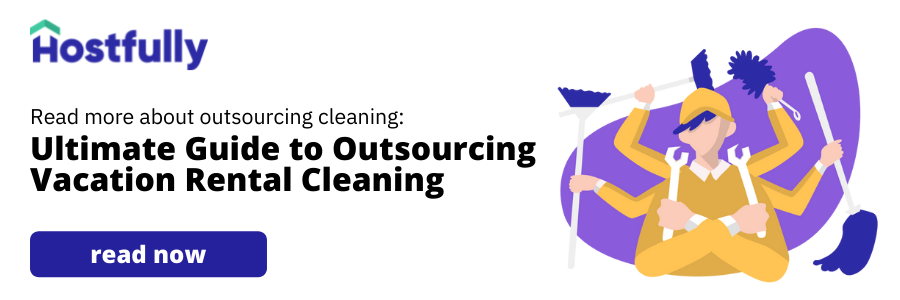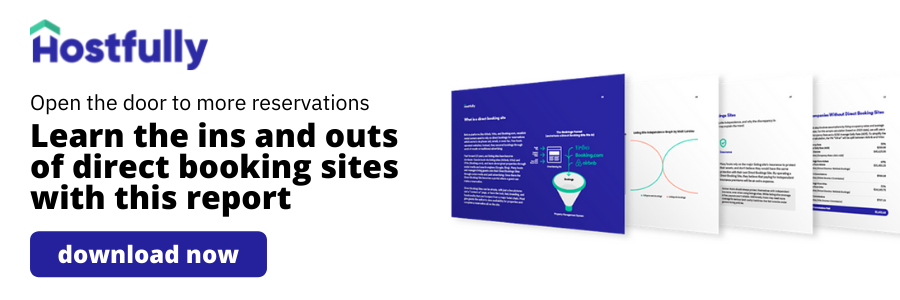Make money renting vacation rental properties with little to no start-up cost.
As house prices continue to soar, the vacation rental industry continues to grow. The increasing costs of homes has been a barrier for many wanting to start a career hosting on Airbnb and building a business in the short-term rental industry. Fortunately, there are other ways to become an Airbnb host without owning a property.
We’ve put together 5 ways you can make money as an Airbnb host with minimal start-up costs.
#1 No need for an entire Airbnb house: Make use of unused rooms
Have you considered making money with your existing home? While you may not be in a position to purchase a property renting out your own place or a portion of it for short-term rental and listing it on Airbnb, Vrbo or Booking.com is possible, as long as your local laws and lease agreement allow for it.
How does it work?
If you’re planning on going away and won’t be using your space, you can opt to rent out your entire home and earn some extra income while you’re gone. Or, if you have an unused room, you could choose to make that available for rent and turn that space into a way to generate some passive income. The upfront costs are minimal, which is great if you’re new to hospitality and unsure if it’s right for you.
If you own your own home, you’ll have to ensure that your local laws allow for short-term rentals. If you’re leasing your home, you’ll also want to make sure that you won’t be breaking any terms in your lease agreement.
Pros
- Meet new and exciting people. You’ll find that most renters are polite, respectful, and barely noticeable during the stay.
- Great for beginners to the hospitality industry: managing only one room is much less stressful than operating multiple properties and being accountable to investors.
- It’s your own Airbnb, which means no profit sharing.
- Additional income to help pay your mortgage or rent and earn an income.
- Gain experience in the vacation rental industry without having to invest in a second property.
Cons
- Having Airbnb guests in your personal space.
- Potential for more maintenance on your appliances and property.
- You’ll need to consider the legal requirements on whether hosting guests at your property is legal in your area and if your rental agreement allows for subletting.
- Not entirely passive: cleaning uses a lot of time.
Tips
- You can use sites like AirDNA or Key Data Dashboard and the What’s My Place Worth tool on Airbnb for market research in your area. Understanding your local rental market will help you set the optimal price.
- Consider hiring a cleaning service for turnover between guests, especially if you’ll be away or you have a busy lifestyle. Reviews are everything in this industry, and you’ll want to make sure you offer your guests a great experience during their stay.
- Learn how to quickly become a superhost. Superhosts earn more per room and have an easier time booking reservations. You can take a few courses to learn the ins and outs of being a superhost.
#2 Become a vacation rental property manager
One of the most direct ways to be on Airbnb without owning property is to manage properties for people who have invested in real estate. Many real estate investors don’t have the time to market their property effectively, manage their reservations, stay on top of maintenance, and offer the customer service necessary to ensure guests have an excellent experience during their stay. That’s where you come in.
What does a vacation rental property manager do?
Becoming a vacation rental property manager is a full-time job. Your responsibilities will be to foster relationships with homeowners and assist them in the administrative and operational tasks related to running a successful short-term rental property. You’ll be accountable for marketing, and guest communication, ensuring that each guest has a smooth check-in and a great guest experience. Your property owners will rely on you to make their investment profitable.
Pros of Airbnb property management
- The average vacation property manager earns $42,217 in the USA, but this number varies greatly depending on the location of your properties and the number of homes you manage and the expertise you bring to the table. The sky can truly be the limit.
- You can set and work flexible hours.
- You’ll have the opportunity to meet lots of new people and network.
- Since you’re doing Airbnb property management, you won’t have to invest in a property to become a host.
Cons
- You’ll be accountable to your property owners for the success of their real estate investment. Owners are always comparing your performance vs traditional long-term rentals.
- You’ll be required to work weekends and holidays as these are busy times for short-term rental properties. It’ll be important to use software and sub-contract out tasks out to save your work-life balance.
- Without experience, getting second homeowners to sign on will be a challenge. But once you get one or two referrals, growing your portfolio gets easier.
Tips
- Ensure you have the right insurance for your business and the properties you manage incase of unforeseen circumstances or damages.
- Consider adding a direct booking site to your marketing plan for more brand exposure and avoiding Airbnb and other OTA fees.
- Use property management software to help you scale your short-term rental business by automating repetitive administrative tasks and organizing your scheduling.
#3 Split the risks of an Airbnb business: Become a co-host
If you’re just starting out in the hospitality field, becoming a co-host is a great entry point to gain valuable experience and earn extra income. It splits the Airbnb hosting experience risk in half, and is a great way to getting the experience needed to become a property manager.
What does an Airbnb short-term rental co-host do?
In many ways you will be required to do the exact same tasks that a property manager does but as an assistant. Instead of being your own boss, you’ll need to work alongside the Airbnb host or experience vacation rental manager and help them with tasks like replacing linens, stocking the kitchen, updating social media, and handling customer service.
While the wage of a co-host can vary greatly depending on various factors, you can expect to make approximately 10-20% of the property’s nightly rate. With this Airbnb business model, you don’t have to own the real estate. The properties you’ll manage will likely be families’ second homes.
Pros
- You aren’t shouldering all the entire responsibility for the property
- You don’t have to pay the mortgage or worry about paying any expenses associated with managing the property
- You have the opportunity to gain valuable experience in the vacation property rental business
Cons
- Less earnings from the profits
- Less freedom to make your own decisions
- Less consistent income depending on how much work your host gives you.
#4 A new Airbnb experience: Use the rental arbitrage business model
It’s no secret that housing prices are skyrocketing, locking many out of the opportunity to invest in real estate. With rental arbitrage, you have the chance to run a short-term rental business by renting out someone else’s property.
There’s a reason many newcomers to vacation rentals are looking at arbitrage as a side hustle. If you structure this type of company right, you can manage multiple properties with minimal involvement.
How to make money with Airbnb arbitrage?
How rental arbitrage works is by leasing a long-term property and then re-renting it out on sites like Airbnb, Vrbo and Booking.com at a nightly rate that not only covers your rent but brings in an additional income. To be profitable, you’ll want to find a property with a low monthly rent and a high average daily rate with the potential for consistent occupancy.
Pros
- You won’t need to invest in owning a property to make money as an Airbnb host.
- Low upfront costs. The money you’d need for the downpayment goes to furnishing the rental.
- If it’s not right for you, wait out a lease instead of offloading a mortgage.
- You aren’t responsible for the wear and tear on the home.
- This business model is easily scaleable once you have your system in place and have done your market research.
Cons
- If laws change regarding rental arbitrage in your area and you can’t continue hosting, you’ll be on the hook for your monthly rental payments.
- Expect an inconsistent income. There are no guarantees that you’ll be able to rent out your properties at the average occupancy rate. Some months will be better than others, and you’ll have to be prepared for that.
Tips
- Landlords may not be open to having you sublet their property for short-term rentals, but if you offer to help them rent multiple properties if they’re a multi-site landlord or offer them a profit share, they may see working with you as beneficial to their bottom line.
- Make sure you’ve counted the start-up costs and the day-to-day operational costs, such as cleaning service fees, insurance, supplies and linens that need to be replaced.
- When choosing which market to invest in, you’ll want to consider the demand for short-term rentals, the potential for revenue growth and how the market has been performing year over year.
#5 Become a short-term rental franchisee
Purchasing a property can be a real obstacle to entering the vacation rental industry, but with some market research and the payment of a fee, you could join a successful vacation rental franchise with established systems already in place and begin your new career hosting Airbnb homes.
How does investing in a vacation rental franchise work?
Different franchises may have different business structures, but the basics are that you must pay an initial franchise fee to the company, providing access to their tried and true systems, marketing, branding, and an exclusive territory where you will manage vacation rentals. You’ll also be required to pay an annual fee or royalties to the company for ongoing support, training, and the use of their proprietary systems. The annual fees are typically 5% of your revenue.
Your return on investment will all depend entirely on the type of franchise you invest with, the associated fees, and the success of your assigned territory.
Pros
- You don’t need to invest in a property to get started
- You get the benefit of their training, support and operational systems
- You’ll benefit from their brand recognition and marketing budget
Cons
- You’ll have to pay the initial investment as well as royalty fees which can range from $55,00 to $100,000+
- Less control to make decisions in your business
- You’ll be confined to your assigned territory
Tips
- Before investing, make sure that you completely understand the company’s business model, fees, and expectations.
- Ensure that the franchise company has an impeccable reputation and operates at a standard that you are comfortable being associated with.
- Make sure that you are completely comfortable with the assigned territory and find out if there will be any opportunities in the future to expand.
The takeaway: It’s possible to be on Airbnb without owning property
The high cost of investing in real estate does not have to be a barrier to entering the vacation rental industry. If you are committed to becoming a successful Airbnb host, you can break into the industry and make a lucrative income without ever investing in owning a property.











